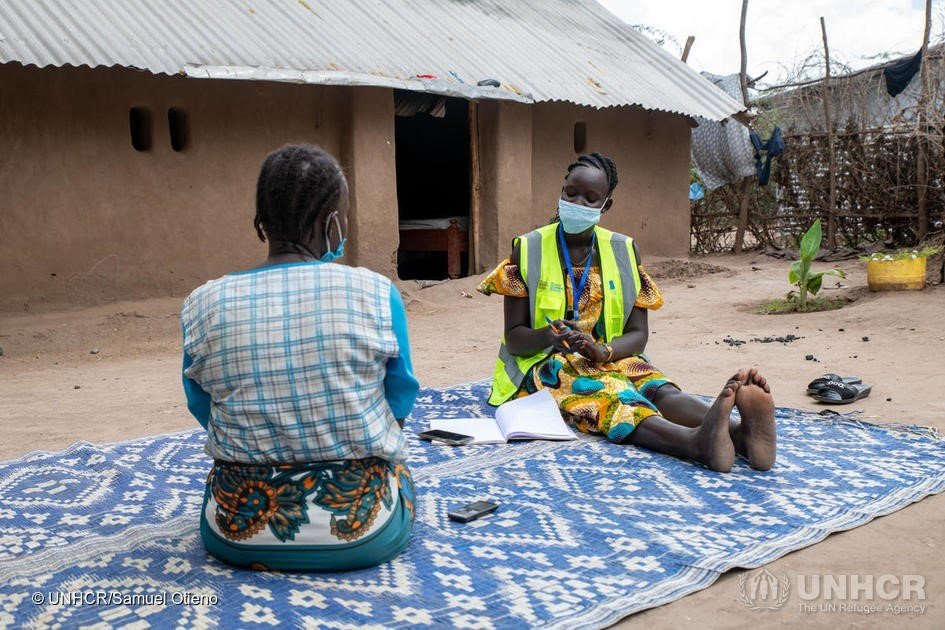Tackling sexual exploitation, abuse and harassment
Image above: UNHCR partner trains refugee women in gender-based violence counselling.
With over 17,000 personnel based primarily in the field, in direct contact with refugees and internally displaced persons, UNHCR is one of the biggest and most operational UN agencies. There are over 97 million people of concern to UNHCR, and our programmes are implemented together with more than 1,100 partners.
We work in environments shaped by significant power differentials and deeply rooted inequalities, including gender inequalities. UNHCR is committed to ending inequality, empowering survivors and to preventing and ending sexual misconduct wherever it occurs. Even one case is one case too many.
"There is no place for sexual exploitation, abuse or harassment at UNHCR, an organization that is dedicated to serving and protecting others."
UN High Commissioner for Refugees, Filippo Grandi
The overwhelming majority of our staff are deeply committed professionals, many of whom are working in difficult environments, sometimes risking their own safety and well-being. But our organization is not immune, and like others, we have seen instances in which our own colleagues or partner staff have used their positions of power to exploit others. The most severe disciplinary measures are imposed if allegations of sexual exploitation and abuse or sexual harassment are established following a disciplinary process. Any UNHCR personnel who engages in sexual misconduct can expect to have their employment terminated.
Sexual exploitation and abuse and sexual harassment inflict intolerable harm on the victims* and their families and run counter to the very values for which UNHCR stands. For this reason, we have taken a series of decisive actions over recent years to reinforce our mechanisms for preventing and responding to sexual exploitation, abuse and harassment, and ensuring that victims receive the support they need.
UNHCR's Strategy and Action Plan against sexual misconduct
In March 2018, the High Commissioner appointed a Senior Coordinator to lead and coordinate UNHCR’s efforts to tackle sexual misconduct. She is supported by a cross-functional working group and reports to the Deputy High Commissioner, who leads a Director Level Task Force on this issue. The Senior Coordinator and her dedicated team work closely with other entities that contribute to UNHCR’s global safeguarding efforts including the Inspector General’s Office, the Ethics Office, the Ombudsman’s Office, the Legal Affairs Service, the Division of International Protection, and the Division of Human Resources, the Division of External Relations, Enterprise Risk Management, the Division of Strategic Planning and Results and works closely with the Regional Bureau.
Building on its initial Strategy and key achievements in 2018, 2019 and 2020, UNHCR launched a new Strategy and Action Plan (2020-2022) which expands on work in previous years and also takes into account developments in the context of the ongoing COVID-19 pandemic.
The four pillars of the strategy are:
- Follow a victim-centred approach in all our practices and procedures concerning sexual misconduct;
- Equip and empower UNHCR and partner personnel to prevent, identify and respond to sexual misconduct;
- Uphold organizational accountability in tackling sexual misconduct;
- Maintain UNHCR’s active role in interagency efforts.
To achieve this strategy, particular attention has been given to prevention and response efforts in our offices and operations, including awareness raising and training efforts for colleagues and partners. We are also actively engaged in interagency initiatives in this respect. Between September 2019 and December 2020, the High Commissioner for Refugees, Filippo Grandi, was the Inter-Agency Standing Committee (IASC) Champion on Protection from Sexual Exploitation and Abuse and Sexual Harassment and our Deputy High Commissioner is the current Chair of the Chief Executives Board’s Task Force on Addressing Sexual Harassment within the organizations of the UN system.
Reporting misconduct
We strive to ensure that reporting mechanisms are known, accessible and trusted and that victims who report sexual misconduct feel safe and protected. We have reinforced mechanisms to ensure that cases of sexual exploitation and abuse are reported, using a range of complaints mechanisms, including face to face engagement, mobile phone technology and call centres.
UNHCR’s Inspector General’s Office acts as an independent internal oversight body. To report misconduct, follow the link here.
The SpeakUp! Helpline is a confidential independent helpline available to UNHCR colleagues who wish to report misconduct or obtain advice on what to do when in doubt. The helpline is managed by an external provider and is available 24/7 by phone, through a web form and a mobile application. It offers the possibility to report in complete anonymity.
UNHCR colleagues may contact the Victim Care Officer as the first port-of-call in relation to concerns over sexual harassment. She provides confidential guidance on processes and services, supports decision making, accompanies victims through the process, provides psychosocial support, coordinates action on their behalf, as well as assesses risks and individual needs. This service also provides guidance to witnesses and advice to managers on support and risk mitigation for sexual harassment.
*In line with the current accepted broader UN approach, we are using the term 'victim' while acknowledging that the term survivor may also be appropriate and preferred in certain contexts (e.g., responding to gender-based violence). As an example of the UN use of the term victim, see, e.g. https://www.un.org/preventing-sexual-exploitation-and-abuse/content/victims-rights-advocate.
Learn more about our work against sexual misconduct:
Useful links
- Tackling sexual misconduct: 2020-2022 Strategy and Action Plan
- Policy on Victim-Centred Approach in UNHCR's response to Sexual Misconduct 2020 (Also available in French)
- The High Commissioner's IASC Championship on Protection from Sexual Exploitation and Abuse and Sexual Harassment (Also available in French | Spanish)
- Find more information on UNHCR's Inspector General and how to report abuse
- Written Evidence submitted by UNHCR to the UK's International Development Committee - Inquiry on Sexual Exploitation in the Aid Sector: Next Steps
- Statement by the Senior Coordinator for PSEA/SH at Standing Committee, 20 September 2018

